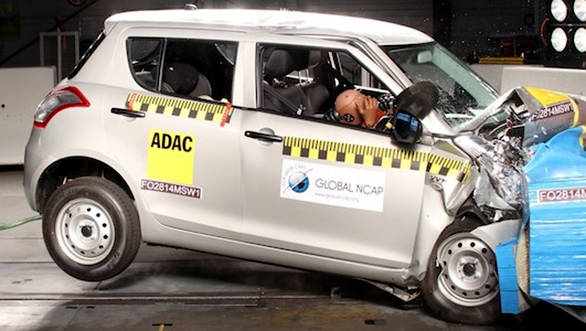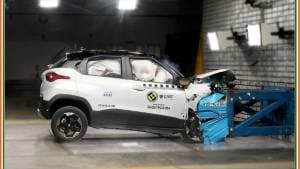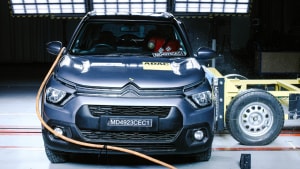The Global NCAP crash tests and the Indian attitude towards safety
A few weeks ago Datsun was placed in the eye of a storm, a storm being whipped by none other than Max Mosley. Max, who was formerly the president of the FIA, is now associated intimately with the United Nations safety program as the president of the Global NCAP.

Max Mosley shot off a letter to the chairman and CEO of the Renault Nissan alliance, Carlos Ghosn, requesting him that the Datsun Go which is sold in India be immediately taken off the market because it was too unsafe to drive. This was a much sterner letter because the previous two intimating Carlos Ghosn apparently fell on deaf ears.
Does this address the safety issues India faces? I don't think so. In my opinion, Max Mosley shouldn't be singling out Datsun but instead get to the root of the problem. Global NCAP must examine the Indian market more closely, and not just what is offered in terms of safety in cars, but also the attitude manufacturers have towards safety. India is touted as one of the most unsafe countries to drive in, globally. The death rate because of motoring incidents is one of the highest in the world. Shouldn't the global NCAP then pay a bit more attention to the conditions and attitudes that exist in India? Max Mosley should be sending a stern letter to the government of India not just to Carlos Ghosn, condemning the safety standards prescribed in India.
The question we all must ask is, how did the Datsun Go ever get clearances to be sold in India if it was this unsafe? How poor are our safety standards? Datsun is not the only manufacturer to get away with the poor safety standards prescribed by the authorities, there are several others involved as well. When questioned, there are two replies I've got consistently from manufacturers. One, the cars meet the Indian safety standards, it's the most commonly bandied about claim. Second, the customer does not demand such safety features and is unwilling to pay for it so why offer it at all. The latter is an absolutely irresponsible attitude towards safety and trust me, I've heard it from almost every single domestic manufacturer.
And yet all the blame does not lie with the manufacturer. The powers that be are the ones to be held accountable above all. Without legislation to promote safety, no corporate body is going to introduce a non-profit initiative out of the goodness of its heart. Not unless forced to do so. That's why the government has to take the first step. Some, like Volkswagen, do it even though there is no legislation in place yet. Don't take this as an admission of social responsibility. It has to do with a larger image that VW projects. Being a global manufacturer, fingers were pointed at the double standards, where in developed countries, the same cars had all the safety features possible while developing countries like India did not.
Then again, there are other offenders, one of the most notorious being Maruti Suzuki. For the largest manufacturer in the country, the attitude towards safety is typical 'if consumer wants, he will get it else he won't.' That explains why cars like the Alto don't even offer a wing mirror on one side of the car.
But why point fingers at the manufacturers? The government itself has little or no inclination towards improving automotive safety in India. To most bureaucrats, safety is simply a term to be used when the flashbulbs start popping off at press conferences. Over the last couple of years, since the number of fatalities on our roads began rising, global attention has shifted towards our conditions. This has in some ways incited the ministry to set in motion a stringent safety mission plan. It mandates the use of airbags and ABS in every new car sold in India and it's expected to come into effect by October 2015. Post that, within the next two years, manufacturers are expected to update older cars already sold in India. This is a promising sign but more needs to be done. Simply adding safety features to a car isn't going to make a journey safer. The entire driving environment needs to change. Hopefully the new Motor Vehicles Act will help get things moving in the right direction.
But it's a slow process. To date there still isn't a proper crash test facility in India to conduct even the most basic crash tests. Most manufacturers in fact conduct their crash testing abroad and present these reports to the authorities. NATRIP will be the first to provide adequate crash testing facilities but the project that started nearly a decade ago is still nowhere near completition. It is estimated that NATRIP will begin operations by 2015 but my estimate is a year or two later for all its applications to go on stream. Which may also push back the other safety related measures.
Compounding that inadequacy, are the low standards set for safety and even the lack of knowledge regarding safety within the ministry. Things like frontal impact, front offset crash, side impact, rear collision, whiplash prevention, the ElK test etc are terms Europeans use, they mean nothing here. Take, for instance, the rear headrests in the new Maruti Alto. They most definitely aren't going to prevent whiplash, and they look more prone to inflict injury than prevent it in case of a rearward collision. I simply have no idea who designed those and did they even know what role a rear seat has to play in a car? Regretfully the problem is that the government, manufacturers and even the customers don't care. Safety has to be a mindset. Attitudes need to change. Life in India is very cheap but that's no reason to expend it so easily.










